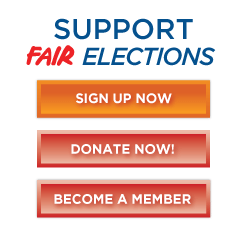Knowledge is power. When a person meets with us, argues for
or against legislation, and asks for our votes, we and our
legislative colleagues insist on knowing who they are
representing, because that's critical in helping us assess
the credibility of the arguments.
But when voters do the same thing we do -- vote to make
laws through ballot measures -- it's not always clear who's
asking for their votes. Special interests often hide on
campaign ads behind happy-sounding committee names that
leave voters in the dark about their real agendas.
That's wrong, and that's why overwhelming bipartisan
majorities of the Legislature passed AB 249 by Assemblyman
Kevin Mullin, D-San Mateo, better known as the California
DISCLOSE Act.
Under AB 249, ballot measure committees and political
action committees supporting or opposing candidates would
be required to display their top three funders in a clear
and conspicuous manner, not in fine print. Most
importantly, it would make sure true funders supporting or
opposing ballot measures are disclosed on ads, even when
their money is moved from one group to another before being
spent.
AB 249 has been a long time coming. For nearly seven years,
grass-roots reformers led by the California Clean Money
Campaign have advocated to strengthen advertising
disclosure rules. The most recent amendments also close
loopholes that would have allowed membership organizations
like chambers of commerce and unions to cloak ad
disclosures by attributing
“earmarked†contributions
to individual dues-paying members rather than the
organization itself.
If Gov. Jerry Brown signs AB 249 into law -- and we urge
him to do so -- California will have the strongest campaign
disclosure law in the country by a wide margin. That's why
of the many elections-related bills our committees heard
this year, none had come close to AB 249's level of public
support.
Voters should have the right to know the identities of
people and organizations asking for their votes. By no
longer allowing special interests to hide behind
meaningless committee names, AB 249 would serve as an
example to the nation for achieving more meaningful
campaign disclosure.




